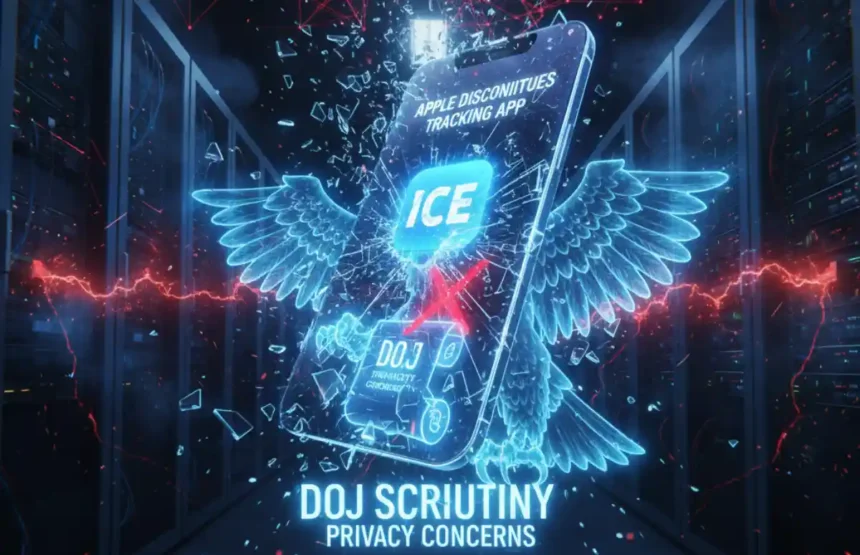In a significant move highlighting the intersection of technology and law enforcement, Apple has removed an app designed to track U.S. Immigration and Customs Enforcement (ICE) activities after facing scrutiny from the Department of Justice (DOJ).
This decision has sparked discussions about privacy, corporate responsibility, and the role of technology companies in government surveillance, raising critical questions about the balance between civil liberties and law enforcement needs.
Background on the App’s Purpose
The app, created by a third-party developer, enabled users to monitor ICE operations, including real-time tracking of ICE vehicle locations and alerts about enforcement actions. Advocates for the app argued that it served as a vital resource for immigrant communities, particularly those vulnerable to deportation.
By providing transparency, the app aimed to empower individuals and families who may have otherwise been unaware of impending ICE activities.
However, the DOJ contended that the app posed significant challenges to law enforcement operations. In a statement, a DOJ spokesperson emphasized, “Alerting individuals to ICE’s activities could significantly impede our ability to enforce immigration laws.
” This perspective highlights a growing tension where the protection of individual rights clashes with the operational needs of law enforcement agencies.
The DOJ’s Involvement
The DOJ’s scrutiny of the app reflects a broader concern regarding the role of technology in facilitating or hindering law enforcement. As technology continues to evolve, the potential for misuse or unintended consequences becomes increasingly pronounced.
The agency’s intervention underscores the challenges that arise when private companies develop tools that directly interface with government operations.
The DOJ’s stance may also indicate a shift in how government entities perceive the role of digital applications in law enforcement.
According to a report from the Center for American Progress, over 70% of local law enforcement agencies have expressed concerns about the use of technology by private entities that could compromise public safety efforts.
Apple’s Response
In response to the DOJ’s concerns, Apple decided to remove the tracking app from its platform, aligning with its ongoing commitment to ensuring that apps on its store comply with legal standards.
An Apple spokesperson stated, “We take our responsibility to protect user privacy seriously and will act in accordance with the law.” While Apple has built its brand around user privacy and security, this decision has ignited debates regarding the ethical responsibilities of technology companies in the realm of social justice.
Critics argue that removing the app could create a chilling effect on community activism and transparency. They assert that technology should empower individuals and provide them with the necessary tools to safeguard their rights, especially in contexts where governmental enforcement can lead to severe consequences.
The Broader Impact on Technology and Privacy
The discontinuation of the ICE tracking app highlights a significant crossroad between technology, privacy, and law enforcement. As digital platforms become more integrated into daily life, the implications of surveillance technologies become increasingly complex. The DOJ’s concerns reflect a growing trend of government scrutiny over how technology can be used to monitor activities and enforce laws.
Data from a recent Pew Research Center survey indicated that 81% of Americans feel they have little to no control over the data collected about them by companies. This statistic resonates with the apprehensions many individuals have regarding surveillance, raising questions about who ultimately controls and benefits from such data.
Reactions to the app’s removal have been polarized. Advocacy groups, particularly those focused on immigrant rights, expressed disappointment, viewing the app as an essential resource for communities facing potential ICE enforcement. Organizations like the American Civil Liberties Union (ACLU) argue that transparency is crucial for protecting civil rights, especially in an era of heightened scrutiny on immigrant populations.
Conversely, law enforcement agencies welcomed Apple’s decision, perceiving it as a necessary measure to ensure that their operational integrity remains intact. This dichotomy illustrates the complexities inherent in discussions about immigration enforcement and the technologies that interface with it. The divergence in opinion underscores the need for nuanced conversations about how technology can serve both community rights and public safety.
The Future of Tech and Law Enforcement Collaboration
As technology continues to evolve, the relationship between tech companies and law enforcement is likely to undergo further scrutiny. The DOJ’s intervention in this case may set a precedent for future engagements between government entities and technology firms.
Experts suggest that the controversy surrounding the removal of the ICE tracking app may prompt tech companies to reevaluate their policies regarding applications that engage with sensitive topics like immigration enforcement.
Dr. Jennifer Urban, a privacy law expert, remarked, “Companies must navigate the challenging balance of supporting community rights while complying with the legal frameworks set by government entities.”
Potential Legislative Changes
This incident may also catalyze legislative actions pertaining to technology and privacy. Advocates are calling for clearer regulations regarding the development and use of apps that engage with law enforcement activities. The goal is to create a framework that protects individual rights while ensuring public safety.
Legislation may also address the broader implications of technology companies’ involvement in surveillance and law enforcement activities. As discussions around data privacy and surveillance continue to gain momentum, the implications of this app’s removal extend beyond a single application, posing critical questions about how technology companies can responsibly engage with government entities.
The Role of Technology in Modern Society
The interplay between technology and society has always been complex. As digital platforms increasingly influence various aspects of life, including law enforcement, the ethical considerations surrounding their use become more vital. The discontinuation of the ICE tracking app serves as a reminder of the responsibilities that come with technological advancements, particularly in sensitive areas such as immigration enforcement.







